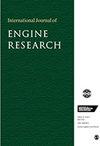Fuel control strategy for robust low-load gasoline low temperature combustion
IF 2.1
4区 工程技术
Q2 ENGINEERING, MECHANICAL
引用次数: 0
Abstract
To achieve robust low-load LTC (Low Temperature combustion), precise metering of fuel is required since the combustion is very sensitive to the variation of the injected fuel quantity, which could range from 1 to 3 mg per injection pulse. Open-loop calibration of individual injectors is simply not a practical option and therefore a fuel control strategy has been developed to ensure robust low-load LTC combustion and validated through experiments on a 2.2 L 4-cylinder LTC engine at two different coolant temperatures. The results show that the fuel control strategy significantly improves low-load LTC combustion stability by reducing cylinder-to-cylinder variation in delivered fuel masses due to different injector characteristics even when engine operating conditions are changed.稳健的低负荷汽油低温燃烧燃料控制策略
要实现稳健的低负荷 LTC(低温燃烧),就必须精确计量燃料,因为燃烧对喷射燃料量的变化非常敏感,每个喷射脉冲的喷射量可能在 1 至 3 毫克之间。对单个喷油器进行开环校准是不现实的,因此,我们开发了一种燃料控制策略,以确保低负荷低温燃烧的稳健性,并通过在两种不同冷却剂温度下对 2.2 升 4 缸低温燃烧发动机进行实验进行了验证。结果表明,即使在发动机工作条件发生变化的情况下,燃料控制策略也能减少因喷油器特性不同而导致的缸与缸之间输出燃料质量的变化,从而显著提高低负荷 LTC 燃烧的稳定性。
本文章由计算机程序翻译,如有差异,请以英文原文为准。
求助全文
约1分钟内获得全文
求助全文
来源期刊

International Journal of Engine Research
工程技术-工程:机械
CiteScore
6.50
自引率
16.00%
发文量
130
审稿时长
>12 weeks
期刊介绍:
The International Journal of Engine Research publishes high quality papers on experimental and analytical studies of engine technology.
 求助内容:
求助内容: 应助结果提醒方式:
应助结果提醒方式:


